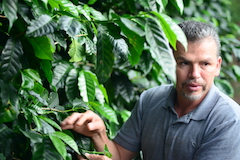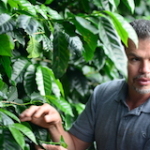 On a modest family coffee farm on a cloud-hugged hillside of Costa Rica, Eulogio Jimenez Porras is trying to get out from the grips of the big coffee houses that dictate a traditional way of processing coffee beans. Eulogio and other small farmers have embraced the “honey process” that dries coffee beans naturally, without the volume of water that can wash acids and nutrients into local waterways. This “honey process” produces a coffee that is becoming a niche rage in gourmet coffee houses, and also is better for the environment.
On a modest family coffee farm on a cloud-hugged hillside of Costa Rica, Eulogio Jimenez Porras is trying to get out from the grips of the big coffee houses that dictate a traditional way of processing coffee beans. Eulogio and other small farmers have embraced the “honey process” that dries coffee beans naturally, without the volume of water that can wash acids and nutrients into local waterways. This “honey process” produces a coffee that is becoming a niche rage in gourmet coffee houses, and also is better for the environment.
LISTEN at PRX :
TRANSCRIPT:
Lede-in: Environmentalists love Costa Rica for its commitment to sustainability and alternative energy. But long before eco-tourism became the rage there, coffee was king. Coffee growing remains a pillar of agriculture in the Central American country. But modern coffee production uses tremendous amounts of water, and can pollute waterways with nitrogen and water carrying the waste of coffee beans.
Some farmers in Costa Rica are trying a new way of processing their coffee beans, which not only helps the environment, but delivers what they say is a unique flavor to your specialty coffee house. It’s called “honey” drying, and reporter Doug Struck went to a coffee farm to learn about it.
00:00
NATSOUND : rustling of bushes… “…it’s completely green. It’s not ready….” (fade under)
STRUCK: Just under the cloud line of Costa Rica’s famous Monteverde Cloud Forest, Eulogio Jimenez Porras tends to 37,000 coffee trees that cling to the sharp folds of his land. His father, and his father’s father were coffee farmers. It’s a modest farm, and Eulogio’s wife Shirley and his two young kids help pluck the coffee berries off the trees in December when the schools let out for the harvest.
Costa Rican farmers traditionally sold their beans to the big coffee houses and the big coffee mills, and took what they got for prices. But Eulogio is among those trying another way to make and sell their crop.
00:45
EULOGIO: At the same elevation, the coffee is completely different. In here, it’s like the chocolate, in there, like fruits, in other… it’s like, flowers. It’s completely different.
STRUCK: Eulogio puts most of his coffee through what is called the “Honey process.” The typical method of preparing coffee for export involves using lots of water to wash off the skin and “mucilage’’—a sticky flesh that surrounds the seeds— to hasten the drying process. That sucks up water from the mountain streams, and without expensive treatment can discharge nutrient-overloaded wastewater back into the waterways.
EULOGIO: Okay, in the big companies, the machines they use, it’s necessary to put with water. You can find all the big co-ops, all are very close from the river.
STRUCK: Eulogio is leaving the mucilage on the seeds while they dry into coffee beans.
To do that, he has to put the beans on raised drying beds and turn them over repeatedly for several weeks. But it uses considerably less water, and imparts a flavor to the coffee bean.
1:55
EULOGIO -To dry the coffee are two options: only mechanic(al) or by sun. We never use mechanic. In mechanic, in 25 hours we’d be ready. But it’s not very good. We separate the shell, slowly, slowly, to have the best quality. This is the form…
STRUCK: For two weeks.
EULOGIO: Exactly.
STRUCK: To further escape the dictates of big buyers, Eulogio has purchased an 7-foot tall, gleaming red roaster. He fires it up to 175 degrees Celsius, pours in his beans into a rotating cylinder, and then packages the roasted coffee in bags Shirley designed with the label ‘Evocare.’ He sells them in tourist shops and hopes to export them directly to other countries to build his brand.
2:45
ARROYO: High end specialty coffee are waking up the curiosity of customers in the States.
STRUCK: That’s Mario Arroyo, head of promotion and project for ICAFE ((E-Café)), the Costa Rican Coffee Institute. He says Costa Rican mills have made dramatic strides in cutting their water usage, and that all the major mills must treat their discharges and provide regular samples for testing.
ARROYO: We produce green coffee coming from a green country.
STRUCK: He says the specialty coffees, like honey coffee, are helping in that effort, bringing higher prices for the farmers and spreading uniquely tasting coffees abroad.
3:23
ARROYO: If you drink a honey process you will find more sweetness in the coffee without, obviously, I think, adding any sugar.
STRUCK: Sebastian SIMSCH ((Sim-shh)) is a fan. The president of Seattle Coffee Works, a small, boutique coffee house, Simsch travels the world to acquire the best coffee beans. He is impressed with the honey coffees of Costa Rica.
3:46
SIMSCH: You can actually taste it in the coffee, it’s better, more complex, more beautiful.
STRUCK: He said growers in Costa Rica are adopting the process in part because they cannot compete with the industrialized methods of Brazil or the cheaper labor in some African coffees.
SIMSCH: At some point you find yourself in the situation where either you make your coffee a lot better and cost more or you’re probably going to get out of the coffee business.
STRUCK: Costa Rica farmers, he says, are making it better.
4:14
SIMSCH: The natural process, by the way, is super-nice for the environment, because there’s no impact. You take the berries off, you dry them, that’s fine. But the wash process, when you, once you have fermented the mucilage and you start washing the mucilage off which is now no longer sticky but it’s highly acidic, that runoff water has a tremendously bad environmental impact on usually on the rivers and streams that it flows into.
SIMSCH: It’s really a potentially damaging process, the wash process– a lot of water is being wasted. And in the honey process, you have the best of all worlds. You are cutting your drying time a little bit from the natural process but you do not use any significant amount of water.
STRUCK: Simsch says consumers in the US won’t pay more just for those environmental advantages.
5:06
SIMSCH: So usually consumers are not willing to pay any significant premium anymore for organic or sustainable, at all. Quite honestly, we don’t either. We don’t pay a premium for environmental. We do pay a premium for quality and sustainability. And that, kind of, usually… we hope, we like to think, we pray, goes hand in glove.
STRUCK: So in coming up with an environmental advantage, the Costa Rican coffee growers have also produced a better cup of coffee.
SIMSCH: Yes, that’s what we love. That’s the sweet spot.
STRUCK: This Doug Struck, in Monteverde, Costa Rica.
